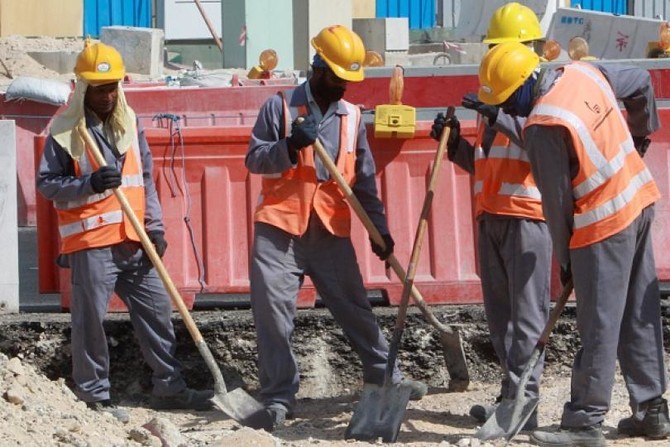DUBAI: World Cup 2022 host Qatar must urgently introduce laws to protect the lives of up to 800,000 migrant construction laborers working in scorching temperatures, Human Rights Watch said Wednesday.
The New York-based organization also called on the Gulf state to investigate workers’ deaths and make those findings public.
“The Qatari authorities’ failure to put in place the most basic protection from the heat, their decision to ignore recommendations that they investigate worker deaths, and their refusal to release data on these deaths, constitutes a willful abdication of responsibility,” said report author Nicholas McGeehan.
He also called on football’s world governing body, FIFA, national associations and World Cup sponsors to demand further protection from heat and humidity for Qatar’s workers.
McGeehan added: “They should also be demanding answers to two simple questions — how many workers have died since 2012 and how they have died?”
Qatar has introduced laws to stop people working outside between 11:30 am and 3:00 p.m. annually from June 15 to August 31, when temperatures can reach around 50 degrees Celsius (122 degrees Fahrenheit).
But HRW says these measures do not go far enough.
“Limiting work temperatures to safe temperatures — not set by a clock or calendar — is well within the capacity of the Qatari government and will help protect hundreds of thousands of workers,” said Sarah Leah Whitson.
Temperatures in Qatar are currently in the high 30s Celsius and humidity levels are above 50 percent.
The HRW says medical research suggests heat stress is a genuine risk to those working outside, and it has called for greater flexibility by Qatari authorities.
In rare praise for Qatar’s World Cup organizers, it said the government should follow the example of compulsory work-to-rest ratios introduced for the 12,000 helping build venues for 2022.
“If Qatar’s World Cup organizers can mandate a climate-based work ban, then the Qatar government can follow its lead,” added Whitson.
However it called for much greater transparency by Doha on the vexed issue of worker deaths.
It said figures were last made available in 2012.
Out of the 520 deaths then for workers from Bangladesh, India and Nepal, 385, or 74 percent, were “neither explained nor investigated”.
The HRW said there had been 10 deaths reported by World Cup organizers between October 2015 and July 2017, eight classified as “non-work related”.
Qatar, FIFA urged to protect 800,000 World Cup 2022 workers from desert heat
Qatar, FIFA urged to protect 800,000 World Cup 2022 workers from desert heat

WHO chief says he is safe after Sanaa airport bombardment

“One of our plane’s crew members was injured. At least two people were reported killed at the airport,” Tedros Adhanom Ghebreyesus posted on X.
Other UN staff were also safe but their departure was delayed until repairs could be made, he added.
Tedros was in Yemen as part of a mission to seek the release of detained UN staff and assess the health and humanitarian situations in the war-torn country.
He said the mission “concluded today,” and “we continue to call for the detainees’ immediate release.”
While about to board their flight, he said “the airport came under aerial bombardment.”
“The air traffic control tower, the departure lounge — just a few meters from where we were — and the runway were damaged.”
The Israeli air strikes came a day after the latest attacks on Israel by Iran-backed Houthis.
The rebel-held capital’s airport was struck by “more than six” attacks with raids also targeting the adjacent Al-Dailami air base, a witness told AFP.
Israel strikes Yemen’s Sana’a airport, ports and power stations

- Houthis said that multiple air raids targeted an airport, military air base and a power station in Yemen
JERUSALEM: Israel’s military said it struck multiple targets linked to the Iran-aligned Houthi movement in Yemen on Thursday, including Sana’a International Airport and three ports along the western coast.
Attacks hit Yemen’s Hezyaz and Ras Kanatib power stations as well as military infrastructure in the ports of Hodeidah, Salif and Ras Kanatib, Israel’s military added.
The Houthis have repeatedly fired drones and missiles toward Israel in what they describe as acts of solidarity with Palestinians in Gaza.
The Israeli attacks on the airport, Hodeidah and on one power station, were reported by Al Masirah TV, the main television news outlet run by the Houthis.
More than a year of Houthi attacks have disrupted international shipping routes, forcing firms to re-route to longer and more expensive journeys that have in turn stoked fears over global inflation.
Israel has instructed its diplomatic missions in Europe to try to get the Houthis designated as a terrorist organization.
The UN Security Council is due to meet on Monday over Houthi attacks against Israel, Israel’s UN Ambassador Danny Danon said on Wednesday.
On Saturday, Israel’s military failed to intercept a missile from Yemen that fell in the Tel Aviv-Jaffa area, injuring 14 people.
Syria authorities say torched 1 million captagon pills

DAMASCUS: Syria’s new authorities torched a large stockpile of drugs on Wednesday, two security officials told AFP, including one million pills of captagon, whose industrial-scale production flourished under ousted president Bashar Assad.
Captagon is a banned amphetamine-like stimulant that became Syria’s largest export during the country’s more than 13-year civil war, effectively turning it into a narco state under Assad.
“We found a large quantity of captagon, around one million pills,” said a balaclava-wearing member of the security forces, who asked to be identified only by his first name, Osama, and whose khaki uniform bore a “public security” patch.
An AFP journalist saw forces pour fuel over and set fire to a cache of cannabis, the painkiller tramadol, and around 50 bags of pink and yellow captagon pills in a security compound formerly belonging to Assad’s forces in the capital’s Kafr Sousa district.
Captagon has flooded the black market across the region in recent years, with oil-rich Saudi Arabia a major destination.
“The security forces of the new government discovered a drug warehouse as they were inspecting the security quarter,” said another member of the security forces, who identified himself as Hamza.
Authorities destroyed the stocks of alcohol, cannabis, captagon and hashish in order to “protect Syrian society” and “cut off smuggling routes used by Assad family businesses,” he added.
Syria’s new Islamist rulers have yet to spell out their policy on alcohol, which has long been widely available in the country.
Since an Islamist-led rebel alliance toppled Assad on December 8 after a lightning offensive, Syria’s new authorities have said massive quantities of captagon have been found in former government sites around the country, including security branches.
AFP journalists in Syria have seen fighters from Islamist group Hayat Tahrir Al-Sham (HTS) set fire to what they said were stashes of captagon found at facilities once operated by Assad’s forces.
Security force member Hamza confirmed Wednesday that “this is not the first initiative of its kind — the security services, in a number of locations, have found other warehouses... and drug manufacturing sites and destroyed them in the appropriate manner.”
Maher Assad, a military commander and the brother of Bashar Assad, is widely accused of being the power behind the lucrative captagon trade.
Experts believe Syria’s former leader used the threat of drug-fueled unrest to put pressure on Arab governments.
A Saudi delegation met Syria’s new leader Ahmed Al-Sharaa in Damascus on Sunday, a source close to the government told AFP, to discuss the “Syria situation and captagon.”
Jordan in recent years has also cracked down on the smuggling of weapons and drugs including captagon along its 375-kilometer (230-mile) border with Syria.
Jordan says 18,000 Syrians returned home since Assad’s fall

AMMAN: About 18,000 Syrians have crossed into their country from Jordan since the government of Bashar Assad was toppled earlier this month, Jordanian authorities said on Thursday.
Interior Minister Mazen Al-Faraya told state TV channel Al-Mamlaka that “around 18,000 Syrians have returned to their country between the fall of the regime of Bashar Assad on December 8, 2024 until Thursday.”
He said the returnees included 2,300 refugees registered with the United Nations.
Amman says it has hosted about 1.3 million Syrians who fled their country since civil war broke out in 2011, with 650,000 formally registered with the United Nations.
Lebanon hopes for neighborly relations in first message to new Syria government

- Lebanon’s Iran-backed Hezbollah played a major part propping up Syria’s ousted President Bashar Assad through years of war
- Syria’s new Islamist de-facto leader Ahmed Al-Sharaa is seeking to establish relations with Arab and Western leaders
DUBAI: Lebanon said on Thursday it was looking forward to having the best neighborly relations with Syria, in its first official message to the new administration in Damascus.
Lebanese Foreign Minister Abdallah Bou Habib passed the message to his Syrian counterpart, Asaad Hassan Al-Shibani, in a phone call, the Lebanese Foreign Ministry said on X.
Lebanon’s Iran-backed Hezbollah played a major part propping up Syria’s ousted President Bashar Assad through years of war, before bringing its fighters back to Lebanon over the last year to fight in a bruising war with Israel – a redeployment which weakened Syrian government lines.
Under Assad, Hezbollah used Syria to bring in weapons and other military equipment from Iran, through Iraq and Syria and into Lebanon. But on Dec. 6, anti-Assad fighters seized the border with Iraq and cut off that route, and two days later, Islamist militants captured the capital Damascus.
Syria’s new Islamist de-facto leader Ahmed Al-Sharaa is seeking to establish relations with Arab and Western leaders after toppling Assad.
















